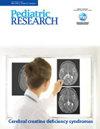散发性法洛氏四联症中 HAND1 基因启动子区变异的鉴定和功能验证。
IF 3.1
3区 医学
Q1 PEDIATRICS
引用次数: 0
摘要
背景:法洛氏四联症(TOF)是一种常见的先天性心脏病(CHD),但HAND1基因启动子区域变异的影响尚未得到探讨:对612名受试者(300名散发性TOF患者和312名健康对照者)的血样DNA进行测序,以确定HAND1基因启动子区域的变异,并通过细胞功能实验(包括双荧光素酶报告基因测定、电泳迁移分析(EMSA)以及使用转录因子结合位点数据库JASPAR进行的生物信息学分析)对这些变异进行进一步检测:结果:在HAND1基因启动子区域发现了8个变异,其中3个仅在TOF患者中发现,包括一个新的g.3639 G > T变异。在体外报告实验中,所有 3 个变异都明显降低了 HAND1 基因启动子的转录活性(p 结论:在 HAND1 基因启动子区域,G.3639、G.3639、G.3639、G.3639、G.3639、G.3639、G.3639):在 TOF 患者的 HAND1 基因启动子区域,发现了 3 个变异,其中一个是首次发现。这些变异降低了转录因子的活性。因此,本研究揭示了 HAND1 基因在 TOF 发病机制中的作用,并进一步揭示了 TOF 形成的遗传基础:对612名人类受试者(300名TOF患者和312名健康对照者)的DNA进行测序,发现了HAND1基因启动子区的8个变异,其中3个变异仅在TOF中发现,包括1个新发现的变异。通过双荧光素酶报告基因检测和 EMSA 检测证实了这 3 个变体的转录活性降低。根据 JASPAR 数据库的预测,这些变体与转录因子的结合位点发生了改变。我们首次证明了 HAND1 启动子中的变体会导致细胞功能障碍。所发现的变体可能在 TOF 的形成过程中起着病理作用。本文章由计算机程序翻译,如有差异,请以英文原文为准。

Identification and functional validation of variants in the promoter region of HAND1 gene in sporadic tetralogy of Fallot
Tetralogy of Fallot (TOF) is a common congenital heart disease (CHD) but the impact of the variants of the HAND1 gene promoter region has not been explored. DNA from blood samples of 612 subjects (300 sporadic TOF patients and 312 healthy controls) was sequenced to identify variants in the HAND1 gene promoter region that were further tested by cellular function experiments including dual-luciferase reporter gene assays, electrophoretic mobility shift analysis (EMSA), and bioinformatics analysis using JASPAR, a transcription factor binding site database. Eight variants in HAND1 gene promoter region were identified with 3 only found in TOF patients including one novel g.3639 G > T. All 3 variants significantly reduced the transcriptional activity of HAND1 gene promoter in an in vitro reporter assay (p < 0.05). JASPAR analysis indicated that these variants may alter the binding sites of transcription factors, potentially associated with TOF formation. In the promoter region of HAND1gene of TOF patients, 3 variants were found only in the patients including one found for the first time. These variants decreased transcription factor activity. Therefore, the present study implies the role of HAND1 gene in the pathogenesis of TOF and further provides new insights into the genetic basis of TOF formation.
求助全文
通过发布文献求助,成功后即可免费获取论文全文。
去求助
来源期刊

Pediatric Research
医学-小儿科
CiteScore
6.80
自引率
5.60%
发文量
473
审稿时长
3-8 weeks
期刊介绍:
Pediatric Research publishes original papers, invited reviews, and commentaries on the etiologies of children''s diseases and
disorders of development, extending from molecular biology to epidemiology. Use of model organisms and in vitro techniques
relevant to developmental biology and medicine are acceptable, as are translational human studies
 求助内容:
求助内容: 应助结果提醒方式:
应助结果提醒方式:


